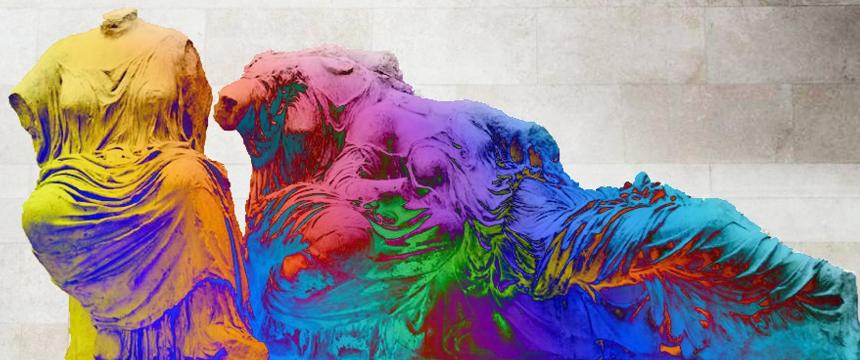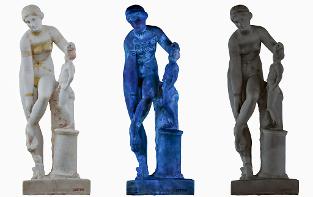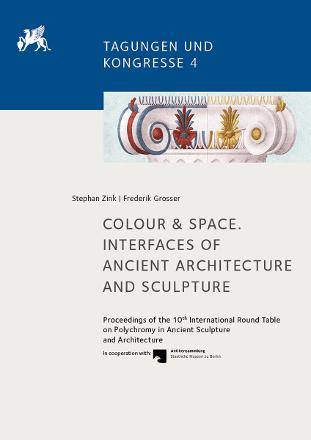
The International Round Table on Polychromy in Ancient Sculpture and Architecture or the “Polychromy Round Table” is a series of meetings dedicated to the study of the polychromy of ancient sculpture and architecture.
The subject of colour in the ancient world has long fascinated scholars. Within the realm of Classical art, historians stretching back to the late eighteenth century have periodically addressed the topic that sculpture and architectural elements from the Greco-Roman world, and beyond, were originally highly coloured.
Recently, interest in this field has once more been reinvigorated by the advent of new scientific techniques and methodologies, as well as by a community of diverse and interdisciplinary scholars, dedicated to the study of the polychromy of ancient sculpture and architecture.
Since 2009, this growing network of scholars has met on a series of occasions(see Past Meetings), first held annually and, since 2016, biennially.
The meetings have a strong tradition of providing an excellent opportunity for experts from a wide range of fields (archaeologists, architectural historians, scientists, conservators, museum and digital humanities professionals) to discuss new research in a stimulating multidisciplinary setting. Papers from a variety of perspectives are encouraged and cover many aspects of polychromy in ancient sculpture and architecture.
The first meeting of the Polychromy Round Table, held at the Ny Carlsberg Glyptotek in Copenhagen in 2009, was made up of only 11 participants. By comparison, 2020's virtual meeting had more than 360 registrants.
Image © Ny Carlsberg Glyptotek
This website collects the experience of these productive and rich encounters at the Polychromy Round Table, in the form of past programmes, abstracts and published proceedings. It also aims to provide a focal point for this network and research community to share news on its investigations, publications and events.
In the inclusive spirit of the Polychromy Round Table and its network, this site also aims to reach out to other researchers who may be considering the subject of ancient polychromy from the Greco-Roman world or relevant comparative studies from their own interdisciplinary viewpoints, geographical areas and time periods.
For further information or to sign up to the mailing list, please email: polychromyroundtable@gmail.com
Join the Polychromy Round Table LinkedIn Group here
Latest information on the next Polychromy Round Table meeting
The 13th International Round Table on Polychromy in Ancient Sculpture and Architecture on
"Polychromy and the Senses: Integrating Scientific, Cognitive, and Aesthetic Perspectives on Ancient Colour"
will be organised in collaboration with the Archaeological Museum of Thessaloniki, where it will take place from
November 18–21, 2026.
For more information and the CfP, see - Next Meeting.
Latest Publications
"Multiband photogrammetry for multispectral 3D reconstruction of statuary"
Daniele Ferdani, Cristiana Barandoni, Federica Bonifazi, Roberta Iannaccone and Donata Magrini
Journal of Cultural Heritage, 2025, 76, 74-85.
Read more here: https://doi.org/10.1016/j.culher.2025.09.003
Published online - 19/09/2025.

"Colour & Space. Interfaces of Ancient Architecture and Sculpture -Proceedings of the 10th Inter-national Round Table on Polychromy in Ancient Sculpture and Architecture"
Edited by Frederik Grosser and Stephan Zink
Published by DAI/Reichert Verlag
The compilation of the contributions to the "10th International Round Table on Polychromy in Ancient Architecture and Sculpture" (Berlin 2020) focuses on the phenomenology of colour in architectural and sculptural contexts. On the basis of case and overall studies from Greco-Roman antiquity to the Middle Ages, the effect of polychromy in spatial contexts is examined. In addition, it explores how colour enhances form and alters meanings, and explores artistic and technological practices. Overall, the volume argues for an interdisciplinary perspective on paint and surface treatment.
More details (including table of contents) here.
Available open-access here.
Published - 14/10/2025.

Upcoming Events
College Art Association of America (CAA) 114TH ANNUAL CONFERENCE, Chicago, Illinois.
18th–21st February , 2026
The CAA Annual Conference is the largest convening of art historians, artists, designers, curators, and visual arts professionals. Each year sessions submitted by our members, committees, and affiliated societies deliver a wide range of program content. The CAA 114th Annual Conference will take place at the Hilton Chicago, February 18–21, 2026. The conference will be held in person with a selection of hybrid sessions and events. Some sessions of possible interest:
Session: Art and Labor in the Ancient Mediterranean World (CAA 114th Annual Conference)
Session: Materiality and the Reception of Ancient Objects (CAA 114th Annual Conference)
Session: Ready for Her Closeup: Producing the Public Image of Ancient Roman Women (CAA 114th Annual Conference)
More information here.
